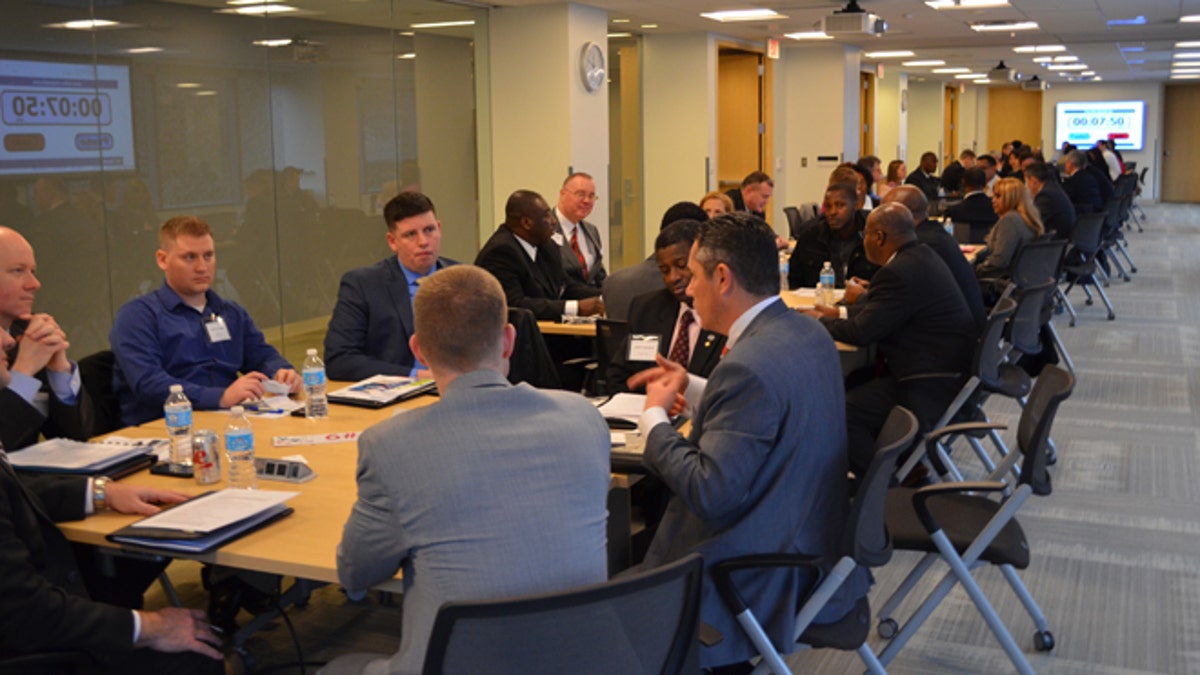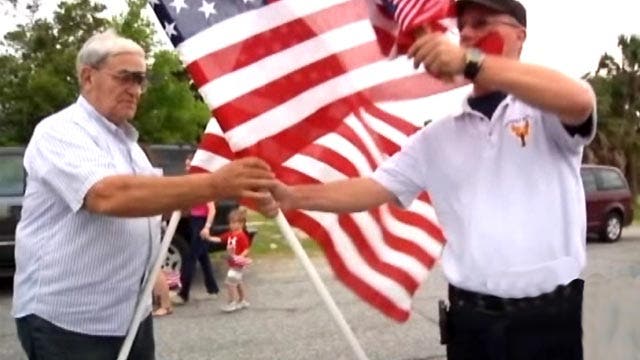Is enough being done to help veterans get back to work?
New initiatives needed to help public and private sectors hire more veterans
For many veterans coming home after multiple tours over 14 years of war, getting a job in the civilian world has been their most personal battle yet, marked by disappointments and dead ends.
But, thanks to a slowly improving job market and active efforts by veterans' groups, officials and recruiters in private-sector companies, that dim outlook is beginning to brighten.
Though still higher than the national average, the unemployment rate among recent veterans has steadily declined. Veterans' advocates say, perhaps most importantly, the mindset in corporate America is starting to change.
It boils down to this: Seeing that hiring a veteran is not just a good deed. It can be a smart hire.
"I think there is a commitment by the corporate community and associations and groups like ours that are trying to make people understand ... We make it a point that veterans should be viewed as an investment, not as a charity," said Mark Szymanski, a spokesman with the Iraq and Afghanistan Veterans of American (IAVA).
This is only the start. Tens of thousands of returning veterans are still looking for work. And the mission of IAVA -- founded in 2004 to help returning vets reintegrate into the workforce -- and similar groups has become only more critical as the Iraq war ended (despite the subsequent return of U.S. forces to combat ISIS) and the U.S. combat mission in Afghanistan drew to a close.
The progress, though, can be charted. At its peak, joblessness for those serving since 9/11 (which labor statisticians refer to as Gulf War-era II vets) was nearly 12 percent in 2011. In January, the Bureau of Labor Statistics announced that number had fallen steadily to 7.2 percent in 2014. On a monthly basis, the latest BLS figures show that among all post-9/11 veterans, the number was 6.9 percent for April, up slightly from 6.5 percent in March.
First lady Michelle Obama, speaking in April on behalf of the four-year-old Joining Forces White House initiative to support vets and their families, credited employers across the country who she said heeded "the call."
"[These] companies were seeing for themselves that hiring our military members and our spouses wasn't simply the patriotic thing to do, it was the right thing to do for their bottom line," she said.
The first lady said that businesses have hired or trained more than 850,000 veterans and military spouses, which she called an "outstanding" number.
Their unemployment rate is still higher than the national one, which was pegged at 5.4 percent for April, and 6.7 percent at the end of 2014. According to recruitment officials who spoke with FoxNews.com, there are several factors at play. Aside from fierce competition in the job markets, many vets don't know where and how to get assistance in finding the right job. All of their contacts are inside the military, and largely unhelpful for networking. Some don't know what to do after years of being told what to do.
Finally, employers themselves don't always understand the value veterans could bring to their workplace.
Many are trying to change that. Since 2011, Verizon has had an active veterans' advisory panel and a robust recruiting program that also includes job-seeking assistance offered at job fairs across the country, and virtual workshops, according to Evan Guzman, the head of Military Programs & Veteran Affairs at Verizon's corporate offices in New Jersey.
"It really started out as a campaign of winning hearts and minds [of the internal organization]," convincing executives that hiring vets was a win-win for everyone, Guzman said. Verizon has hired 3,000 post-9/11 vets since 2013.
Aside from its own efforts, Verizon is also part of the Veterans Employment Initiative at the Northern Virginia Technology Council (NVTC), which brings together greater Washington, D.C. firms, many of them defense and technology contractors, to recruit and mentor vets through transition.
This includes resume building, interviewing and, of course, networking. "It's one thing to leave the military with a resume," said Guzman, "but if you can't network, you're going to find yourself stuck."

Shown here is a veterans recruitment event sponsored by the Northern Virginia Technology Council. (Courtesy of NVTC)
NVTC's member companies told FoxNews.com that they have tens of thousands of applications coming into them every week (there are currently 198,000 veterans' resumes on file at NVTC's website). NVTC has worked with 368 vets directly for transition and placement, and provided one-on-one mentors for 78.
"There is a lot of outreach going on," said Gabe Galvan, the Veterans Affairs portfolio director for the MITRE Corporation, a nonprofit organization that operates research and development centers for the federal government. Some 20 percent of its workforce are veterans, including severely disabled. "We have a supply of people leaning in who can deliver these structures of support to the veterans," he said. They also have also designed a "boot camp" to get other employers on board.
Eric Bartch, who runs the veterans outreach program at CACI, a major federal defense contractor based in Northern Virginia, says its important that the employers are providing a pipeline for vets, and veterans seek that connection out. Otherwise, they are sending resumes blindly to companies, which might as well be a black hole. CACI gets over 1,400 veteran applications a week, and over 5,000 a month, he said. Right now its workforce is 30 percent veteran, and of that number, 7 percent are disabled.
"There is just so much competition," Bartch said. "[Veterans] really need to have someone inside the company to be their advocate, look for those military support teams that most companies have now -- reach out to them first." He said CACI is part of a healthy network of companies in the area, along with Joining Forces and other groups, providing a bridge. Veterans that are in demand include those with IT, cybersecurity, security, logistics and litigation skills.
But outside the Beltway, the job market is not as flush with federal contracts, and not every company has a small army of people working solely in veterans outreach. The economy is still struggling, especially in America's small towns and rural areas.
"The gap is closing but the economy is still sluggish. The companies, in many cases, don't have the openings," said Rep. Tim Murphy, R-Pa., who as chairman of the Oversight & Investigations subcommittee has been at the forefront of probes into the rash of scandals at the nation's VA health care facilities.
"In Kentucky and West Virginia, coal companies are closing down. This is hurting people because they can't come home and work. A lot of your grunts come from small towns, they hope to make a new life for themselves and then come home to find their town just isn't hiring," he told FoxNews.com.
Many of the young vets coming home from war have a double strike by being out of the civilian workforce for years -- if they ever were in it. Young infantrymen and women for example, don't know what their battlefield skills are good for. Then there is prejudice.
"People are still concerned about hiring a vet with a disability and mistake a disability for inability, though I think some of those concerns of five or six years ago have gone down. But it has been difficult for employers to understand," Murphy said.
Veterans offer "safety, teamwork, loyalty and knowing how to get the job done," he told FoxNews.com. "I just met a former general in charge of hiring for a company who said he is hiring veterans because they can read maps. You just can't train someone on the assets the military builds into you."
This is where groups like IAVA come in. They work with employers to make sure they are not just in "reactionary" mode, hiring vets to plug gaps in low-wage paying jobs, or because they feel compelled to. They also want to take that "grunt" and help him or her sell themselves to the employer.
Matt Ross, project manager for the employment programs at IAVA, is planning the group's May 18 Career Boot Camp in New York City. He recalls one of his own early interviews when transitioning out of the military. "I told [the interviewer] I was a rifleman," he recalled.
After she asked what that meant, "I drew a blank, I hadn't prepared for that. I could have said, it meant accountability for equipment, [and experience in] logistical and operational planning."
It's that type of prep work the Boot Camp hopes to offer.
Employers will be there, too. "We're not out there begging for jobs, or to give people a break," said Szymanski. "We're saying, invest in a veteran, invest in their programs, because they will pay off and our country will be better."

























